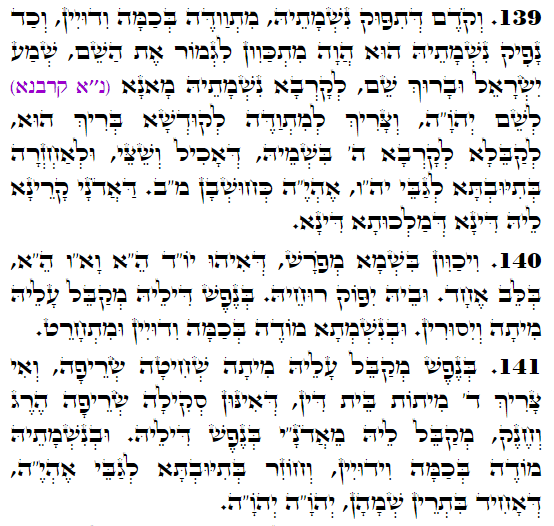Daily Zohar # 3896 – Tzav – The last meditation
Daily Zohar 3896

Hebrew translation:
140. וִיכַוֵּן בַּשֵּׁם הַמְפֹרָשׁ, שֶׁהוּא יוֹ”ד הֵ”א וָא”ו הֵ”א, בְּלֵב אֶחָד, וּבוֹ תֵּצֵא רוּחוֹ. בַּנֶּפֶשׁ שֶׁלּוֹ מְקַבֵּל עָלָיו מִיתָה וְיִסּוּרִים, וּבַנְּשָׁמָה מוֹדֶה בְּכַמָּה וִדּוּיִים וּמִתְחָרֵט.
141. בַּנֶּפֶשׁ מְקַבֵּל עָלָיו מִיתָה, שְׁחִיטָה, שְׂרֵפָה. וְאִם צָרִיךְ אַרְבַּע מִיתוֹת בֵּית דִּין, שֶׁהֵם סְקִילָה שְׂרֵפָה הֶרֶג וְחֶנֶק, מְקַבֵּל אוֹתָם מֵאֲדֹנָ”י בַּנֶּפֶשׁ שֶׁלּוֹ. וּבְנִשְׁמָתוֹ מוֹדֶה בְּכַמָּה וִדּוּיִים, וְחוֹזֵר בִּתְשׁוּבָה אֶל אֶהְיֶ”ה, שֶׁאָחוּז בִּשְׁנֵי שֵׁמוֹת – יְהֹוָ”ה יְהֹוָ”ה.
.
Zohar Tzav
Continued from previous DZ
#139
Before a person dies, he makes confessions, and when his soul leaves the body, he meditates to complete the unification of Malchut with Zeir Anpin. It is made with the Shema Israel that is an aspect of Zeir Anpin, and the “Baruch Shem,” which is the unification of Malchut. The soul is brought to the Holy One Blessed be He as a sacrifice to the Holy Name, YHVH. The confession helps to cleanse the soul before it is offered and accepted as the letter ה H represents Malchut with the aspect of burning the sacrifice. With repentance, the הH is joined with the upper parts of the name יהו YHV and with the name אהיה AHYH. Both names have the numerical value of 42, and when the ה H joins יהו YHV to complete the name, there is a supernal unification between Chokmah, YHVH, and Binah אהיה AHYH.
Before the unification, Malchut was called אדני ADNY, a name that has the letters דינא DYNA that means judgment. It tells us that Malchut has the judgment and the supernal unification is not complete in this state.
#140
When the soul leaves the body, the meditation is to have the unification of the heart, לב, with the name of Zeir Anpin that is יוד-הא-ואו-הא. At that time, the soul also accepts the pain and death with regrets about past sins.
#141
With the soul level of Nefesh, he accepts slaughter and burning like the sacrifice on the altar. If his correction requires the four types of deaths; stoning, burning, death by sword, and suffocation, he accepts them in his soul level of Nefesh with the name אדני ADNY. With his level of Neshama, he makes confessions. He returns with Teshuva to the name אהיה AHYH that is Binah and holds to two YHVH names, one from Chokmah and one from Zeir Anpin because Binah receives from Chokmah and gives to Zeir Anpin.
Lesson;
The heavens welcome the soul when it comes as a sacrifice, meaning that the body returns the soul to its roots. The different types of death make the final cleansing in Malchut before the soul leaves the body, so even in our last breath, we accept the judgment and the kind of death we experience.
If a person has the merit to know and feel his last moments in this world, he follows the meditation recommended by the Zohar above guarantees entrance to the Garden of Eden. A short or long process in Gehennam is still required to cleanse the sins made with the body in this world.
The Light of Torah earns us the merit to be ready for death. Even the pain that we go through before passing is a blessing, which means an easier and short cleansing process above.
Jacob asked Hashem to let him know before his soul is taken so he can bless his children.
Since we don’t know the time of our soul’s departure from this world, we prepare every day with confession and correction of our sins as if we leave the world at any moment. This is why we confess before going to sleep, and it is essential to cleanse the soul at that time.
The next day would be better when we removed the weight of our iniquities before the night’s sleep. Look for the bedtime Shema in your prayer book or on the website.
{||}

 Previous: Tzav
Previous: Tzav
